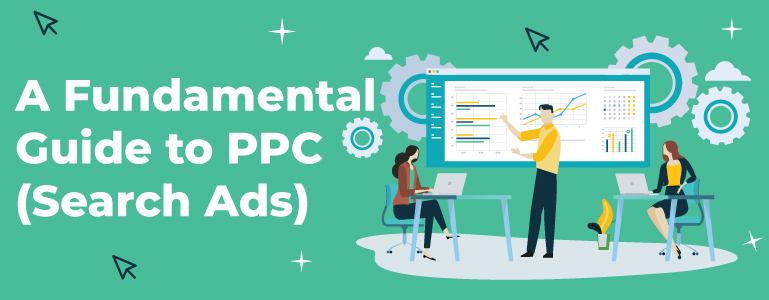A Fundamental Guide to PPC (Search Ads)
Pay-per-click marketing is what it sounds like; you pay for your advertisement based on how many clicks it receives. In conventional advertising, advertisers would only pay for an ad if they knew how many impressions, conversions, or click-throughs they would receive.
With PPC, you pay every time your ad is clicked rather than a predetermined monthly charge. In addition, numerous networks, like Facebook, Google, Twitter, Instagram, and LinkedIn, allow you to conduct PPC adverts. The platform will handle the rest after you select the budget, the advertisement, and the target audience.
When consumers search for your specified keywords on Google, your paid advertisements appear at the top of the results. Likewise, your advertisement would appear on the social media feed. They will be marked as sponsored postings to let viewers know that these advertsare not part of an organic post or search result. Google, Facebook, or any other site you’re utilizing won’t continue to run your ad once you’ve spent all of your money.
So, should you invest in PPC? Let’s go over a few points to help you decide.
What are the advantages of PPC?
A paid search campaign starts working immediately, one of our favorite aspects of Google advertising. Your company will appear at the top of users’ search results when they use the keywords you set, allowing you to bring their attention to your website and, ideally, turn them into leads.
Speaking of a budget for paid advertising, we love that PPC choices like Google advertising, social media advertising, and others give you complete control over every dollar you spend. You save money while bringing in visitors, turning them into leads, and tracking your return on investment (ROI) for sponsored marketing by placing restrictions on your daily ad spend. Additionally, there is practically no minimum expenditure requirement, making PPC available to companies of all sizes.
If you want to drive visitors to your website using sponsored advertisements, focus your adverts on increasing pay-per-click advertising’s efficacy. You have a fantastic opportunity tobe very particular about the population you want to reach with PPC Google ads campaigns, social media ads, and comparable platforms.
And these sound all good – but here are a few vital things if not taken seriously, may lead to an unsuccessful PPC campaign
- You must invest time in your PPC campaigns; you cannot simply set them up and walk away. To achieve the best results, you must put time into optimizing and upgrading.
- Setting up successful campaigns can take some practice, so in the end, many companies decide to work with a specialized agency.
- Costs can build up rapidly, and money can only be recovered if you track and optimize your campaigns to ensure a return on investment. PPC campaigns require a budget instead of SEO strategies that only require time and expertise investment.
- Visits and clicks do not always result in sales; once a person reaches your website, you must persuade them to “convert.”
When to invest in PPC
- For immediate results.
PPC search campaigns will produce results quickly. Your adverts will be shown promptly for millions of people to see as soon as your PPC campaign is approved (assuming your bids are high enough to deserve priority placement). As a result, PPC works incredibly well with product launches, squeeze pages, CPA marketing, affiliate marketing with high-converting offers, joint venture (JV) projects, seasonal promotions, event-focused marketing, and similar online business initiatives.
- When your website needs to be built with SEO in mind.
SEO demands websites with lots of information that are updated frequently. The only way to alert search engines to the relevance of your site and to remind them to maintain it at the top of the list is through PPC.
PPC can be a terrific strategy to increase visibility, reach, and lead conversion in a condensed amount of time after balancing the benefits and drawbacks of sponsored advertising. But, conversely, it can also get pricey quickly, so success hinges on being informed. For this reason, we frequently advise combining PPC with organic SEO (via content marketing) to assist you in achieving your marketing objectives without going over budget.

